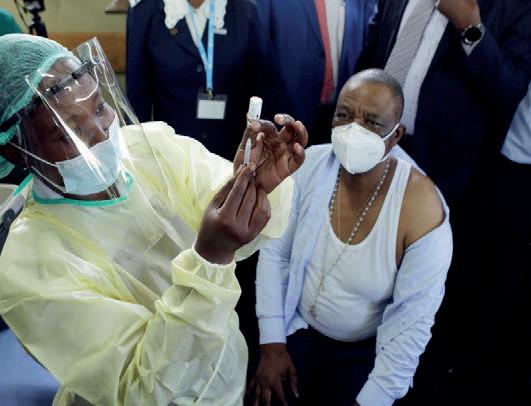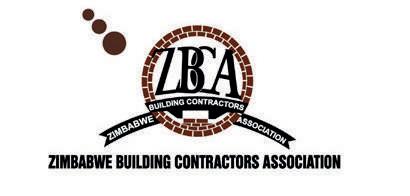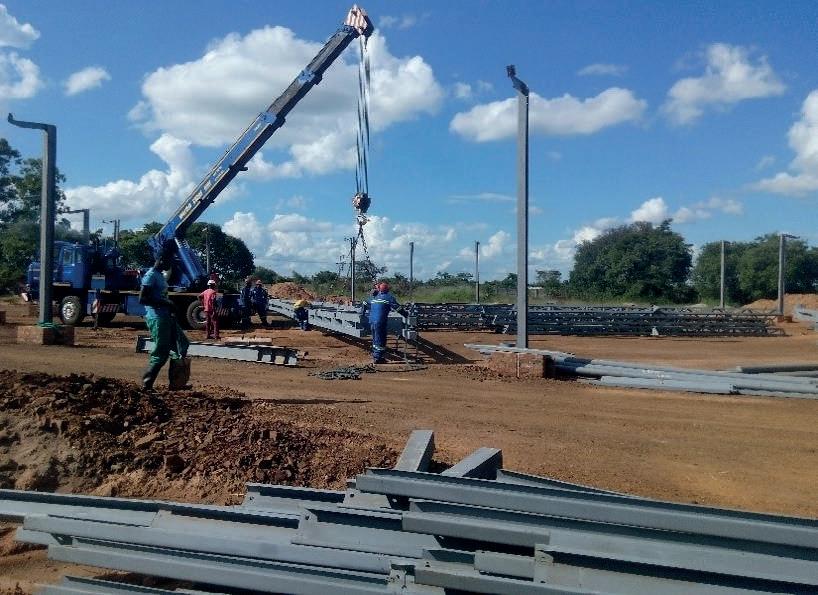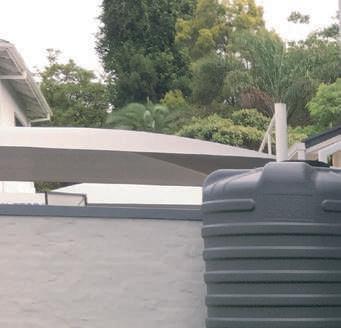
8 minute read
PMZ on the Launch of Covid-19

Free Covid 19 Vaccination
Advertisement
Program By Peter Banda
Zimbabwe Launches free Covid 19 Vaccination Program: the Covid 19 Vaccination program, the inoculation kicked off on 18 February 2021 with the Vice-President and Minister of Health Dr. to be vaccinated against Covid-19 at a ceremony in Harare.
Vice President (VP) and Minister of Health and Child Care Dr Constantino Chiwenga signalled the commencement of the country’s vaccination programme, by taking the jab in public. Zimbabwe kickstarted the vaccination programme after receiving a donation of 200 000 shots of the Sinopharm vaccine from The People’s Republic of China.
Against a background of safety persimism from some quotas which have pessisted even after World Health Organization (WHO) assurances, VP the vaccination programme.
49 000 health workers and thousands of other high-risk frontline staff Sinopharm vaccines that arrived from China on Monday 15 February 2021. The Covid 19 second wave has brought in the South African variant with 61 percent of Zimbabwe cases now being this variant, which spreads faster and has a higher death rate than the original variant which has largely receded. Lockdown regulations are to be tightly enforced to minimise the higher risk.
As the highest risk groups are vaccinated, the programme moves to stage two of phase one, targeting those with serious medical conditions and the over 60s, China’s batch of Sinopharm doses will be augmented by a far larger shipment also from China next March 2021.
The immunisation programme is targeting 10 million people in three phases which represents 60% of the population, to complete the phase. Funds to roll-out the project will be sourced through Government budgets, public-private partnerships and donations.
Zimbabwe “has also submitted its expression of interest” to be part of an initiative by the African Union to bulk buy vaccines for the continent. The Zimbabwe Government says it has budgeted $100 million for vaccines and local businesses have also been asked to donate to the effort.
Vaccination campaigns are just beginning to be launched across Africa, with jabs being given in just a handful of the continent’s 54 countries. Africa has a total population of 1.3 billion people and believed to be an undercount.
Africa, began its vaccination campaign Wednesday using the Johnson & Johnson vaccine.
Across Africa, a massive campaign is required to vaccinate an estimated 680 million people to achieve population immunity, according to the Africa Centers for Disease Control and Prevention. Experts expect vaccines to start arriving on the continent in higher quantities later this year and next year.
Zimbabwe, like many other African countries, initially recorded low numbers a spike in cases. There are fears that a new, more infectious variant of the virus came to the country when scores of thousands of Zimbabweans living in neighbouring South Africa returned home for the holiday season.
Zimbabwe has reported 35,423 COVID-19 cases, including 1,418 deaths, and 277 deaths at the beginning of December. The country’s once-robust public health system has deteriorated along with the economy over the past two decades.
After being vaccinated, VP Chiwenga said new infections are beginning to drop “sharply.”
“The marked decline in new cases is vividly heralding the end of the second wave of the pandemic,” he said.

TOWARDS THE REGULATIONOF THE ZIMBABWE CONSTRUCTION SECTOR
There have been concerns about the local contractor who has been seen as lacking capacity. The contractors themselves are concerned that public jobs are being awarded to foreigners ahead of locals thus denying them an opportunity to build their capacity. There are also concerns of downright corruption in the sector as evidenced by the activities of tenderpreneurs and land barons. Although regulation of the sector has been through Associations such as ZBCA using a Code of Conduct for members, membership of an association is voluntary. The majority of the “companies” are not registered with any Association and thus operate as they wish. When they fail to deliver all contractors including those being regulated through Associations are then painted with the same brush of lacking capacity and ethics.
All these challenges arise from the fact that the sector is not regulated. The Zimbabwe Building Contractors Association (ZBCA) and the Construction Industry Federation of Zimbabwe (CIFOZ) under the banner of the Joint Industrial Commission (JIC) in partnership with the Government of Zimbabwe through the Ministries of Local Government and Public Works, and National Housing and Social Amenities have come up with the Zimbabwe Contractors Construction Council Bill 2019. The principles of the Bill which were debated and approved by cabinet recently seeks to establish the Zimbabwe Construction Contractors Council of Zimbabwe whose functions of regulation; registration of local and foreign companies; discipline control; project registration and monitoring; standards control; capacity

evaluation; standardization of contract documents, codes of practice and legal contractual procedures; and the making of by-laws will go a long way
The Zimbabwe Building Contractors Association now awaits with keen interest the unfolding legislative process to enact the Bill into an Act of Parliament which will bring Zimbabwe into line with her peers in the Southern African Development Community (SADC) region who have regulated their resulting in capacity enhancement, savings on foreign currency as more locals get opportunities and employment opportunities to Zimbabweans.

PROPOSAL FOR SMALL HOLDER FARMERS COMMUNITY BASED IRRIGATION SCHEMES
INTRODUCTION
Food insecurity and hunger have been threating the lives of many communities in Zimbabwe. This has led to increased criminal activities, increased rate of communicable diseases and poverty. These challenges can be addressed by setting up small, manageable community projects that can guarantee continued income generating mechanisms that can aid to alleviate poverty and hunger. The greatest advantage in the implementation of such project is that Zimbabwe economy is Agrarian in nature.
Purpose
The purpose of such an initiative is to stimulate the following: 1. Employment creation and empowering of locals 2. Contain food insecurity levels and eradicate hunger in society 3. Improved healthy diet 4. Contribution to Gross Domestic Product of the nation 5. Reduced crime rate 6. Reduced rate of communicable diseases
Project Description
Community Based Irrigation schemes are structures meant to proof the food coffers for the vulnerable. These provide locals with a task of growing agriculture produce for consumption and selling so as to alleviate hunger and poverty. They consist of tracts of land, water storage tanks and irrigation system. The irrigation systems convey water to plants so that they reach maturity. Once the produce has been harvested it can example of a typical setup that can be made: example of a typical setup that can be made:
Figure 1: Solar Powered Irrigation Model Scheme. Goals and Objectives

The major driving goals are adopted from the United Nation Sustainable Development Goals of 2030 namely:
1. Goal 1: End poverty in all its forms everywhere 2. Goal 2: End hunger, achieve food security and improved nutrition and promote sustainable agriculture 3. Goal 8: Promote sustained, inclusive and sustainable economic growth, full and productive employment and decent work
The objectives to these respective goals comprise of:
1. To identify possible sites to implement project 2. To design a sustainable irrigation system 3.
Research Questions
1. What impact will the project have on the communities in terms of socio-economic aspects? 2. Will the project be self-sustaining after initial piloting? 3. Which organisations will appraise the project and are willing to engage and achieve set goals?

The following Gantt chart with proposed timelines outline the activities to be completed.
Time (Week)
1 2 3 4 5 6 7 8 9 10 11 12
A. PLANNING
2. Desktop Study 3. Feasibility Study Planning 5. Preliminary Designs 7. Final Designs 8. Pre-contract Arrangement 9. Approval
B. CONSTRUCTION
4. Tender Documents 5. Pre-contract Planning 6. Procurement of Materials
C. MONITORING AND EVALUATION
1. Project Costs 2. Quality Assurance 3. Maintenance Scheduling
seeks to assign possible outcomes for respective participants.
•Value for money •Profits •Agriculture
Infrastructure
Development •Improved Foreign
Direct Investment
Clients Designers
•Skills Development •Research •Innovation •Experience
•Employment Creation •Income Generation •Produce Consumption •Improved Nutrition •Diversified agriculture techniques Users Manufacturers
•Product assimilation •Product Distribution •Brand Advertisement •Increased Gross
Domestic Product
Support Need and Cost
It is vital that Government and Private sector take the thrust to alleviate increase private sector capital funding for public facilities. The idea risk into the private sector. This system seeks to engage all participants in ensuring that food security in the country is established.
Contact: Edward Takudzwa Antonio BSc (Honours) in Civil Engineering (UZ) Email: antonioet90@gmail.com Cell: +263778206302, +263718513737





Main Offices
25 G Silundika Ave Office 402, 4th Floor Regal; Star House Harare, Zimbabwe
Sub Offices
Nabro Building, Office Number 4 Number 16, 2nd Avenue Kwekwe, Zimbabwe
Contact Info

















